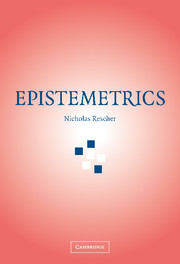Book contents
- Frontmatter
- Contents
- Preface
- 1 Asking for More Than Truth: Duhem's Law of Cognitive Complementarity
- 2 Kant's Conception of Knowledge as Systematized Information
- 3 Spencer's Law of Cognitive Development
- 4 Gibbon's Law of Logarithmic Returns
- 5 Adams's Thesis on Exponential Growth
- 6 Quality Retardation
- 7 How Much Can Be Known? A Leibnizian Perspective on the Quantitative Discrepancy Between Linguistic Truth and Objective Fact
- 8 On the Limits of Knowledge: A Kantian Perspective on Cognitive Finitude
- Conclusion
- Bibliography
- Index of Names
Conclusion
Published online by Cambridge University Press: 06 August 2009
- Frontmatter
- Contents
- Preface
- 1 Asking for More Than Truth: Duhem's Law of Cognitive Complementarity
- 2 Kant's Conception of Knowledge as Systematized Information
- 3 Spencer's Law of Cognitive Development
- 4 Gibbon's Law of Logarithmic Returns
- 5 Adams's Thesis on Exponential Growth
- 6 Quality Retardation
- 7 How Much Can Be Known? A Leibnizian Perspective on the Quantitative Discrepancy Between Linguistic Truth and Objective Fact
- 8 On the Limits of Knowledge: A Kantian Perspective on Cognitive Finitude
- Conclusion
- Bibliography
- Index of Names
Summary
In concluding, a brief survey of the principal theses may be in order. They stand as follows:
Duhem's Law of Security/Detail Complimentarity. The security and detail of our knowledge stand in a relation of inverse proportionality. (Chapter 1)
Kant's Principle of Cognitive Systematization. Knowledge, in the qualitative and honorific sense of the term, is a matter of the extent to which information is coherently systematized. (Chapter 2)
Spencer's Law of Cognitive Development. Cognitive progress is accompanied by complexification and can be assessed in terms of the taxonomic complexity of the information manifold at hand. However, this complexity is not proportional of the amount of information, but to its logarithm. And this yields –
Kant's Principle of Question Propagation. The progress of knowledge-development in the course of resolving our questions always brings new questions to light. (Chapter 4)
Gibbon's Law of Logarithmic Returns. The quantity of knowledge interest in a body of information is proportional not to the size of this body, but merely to the logarithm thereof. (Chapter 4)
Adams's Thesis of Exponential Growth. Throughout recent history the body of scientific information has been growing exponentially. But, in view of Gibbon's Law, this means that cognitive progress in terms of actual knowledge has been growing at a rate that is merely linear and thereby stable. (Chapter 5)
Quality/Quantity Alignment. The lower levels of informative quality information that define the lesser degrees of “knowledge” are in volumetric alignment with the λ-power (0 < λ ≤ 1) of the total amount of information at hand. (Chapter 6)
[…]
- Type
- Chapter
- Information
- Epistemetrics , pp. 105 - 106Publisher: Cambridge University PressPrint publication year: 2006



